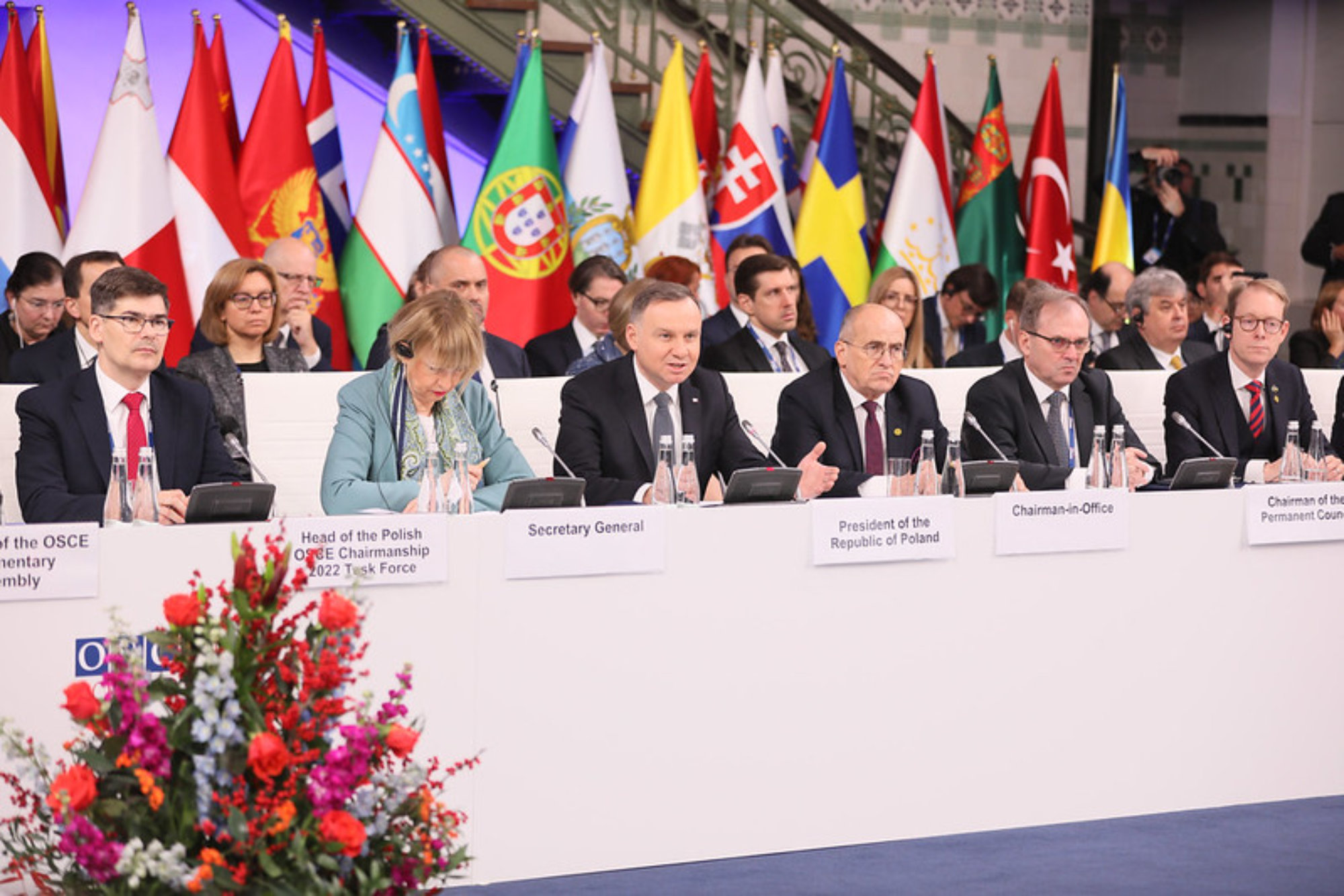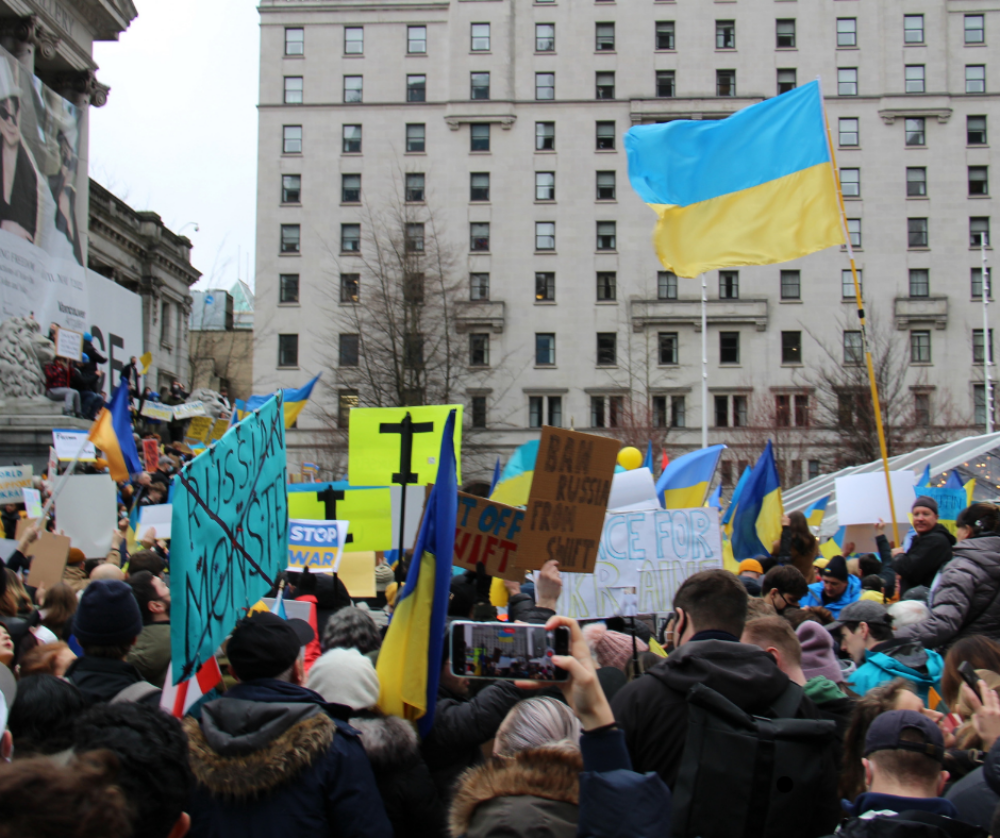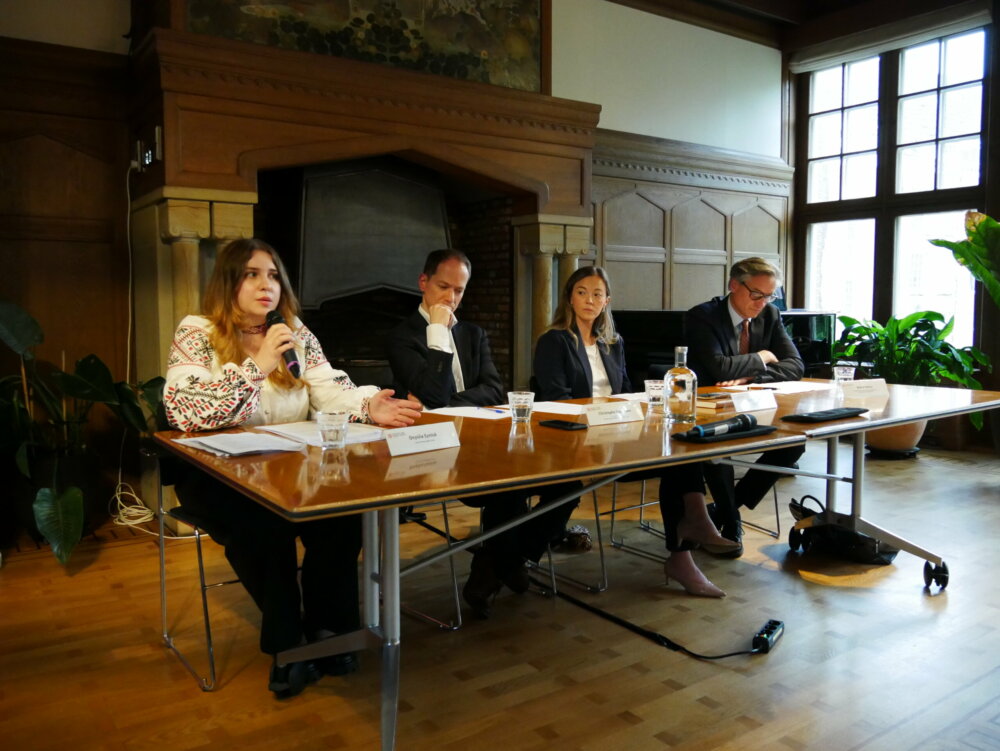OSCE/Ministry of Foreign Affairs of Poland

OSCE Ministerial Council in Łódź displays united front against Russia but fails to adopt decisions
The 29th OSCE Ministerial Council meeting convened on December 1-2 in a former power plant in Łódź, Poland, amid the ongoing Russian war against Ukraine.
The unprovoked Russian invasion of Ukraine has claimed tens of thousands of deaths, with evidence of war crimes committed by Russian troops; it has resulted in the destruction of critical civilian infrastructure in Ukraine, and has led to millions of Ukrainians having to flee their homeland.
Western OSCE states all unequivocally condemned the Russian aggression against Ukraine and Moscow’s violation of all principles of the 1975 Helsinki Final Act, the OSCE’s founding document.
For the first time in the OSCE’s history, the Chair decided to ban one high-level government representative from attending the meeting. Russian Foreign Minister Sergey Lavrov was prohibited from attending the Ministerial Council meeting because Poland decided not to issue a visa for him. Russia was represented by Alexander Lukashevich, Russia’s Ambassador to the OSCE, instead.
Before the formal opening of the OSCE Ministerial Council, that was attended by 40 foreign ministers, Polish President Andrzej Duda gave an unusual speech. Heads of State are usually only present at OSCE Summits. But Poland seemed eager to demonstrate its deep support for Ukraine by having its president address the ministers.
“Russia’s brutal aggression against Ukraine has dominated the Polish Chairmanship of the OSCE, putting aside all other goals we set ourselves at the start,” Duda said. “Unfortunately, for the first time since the end of the Second World War, have we witnessed such a blatant military violation of the principles to which we had all voluntarily subscribed in order to prevent another war in Europe.”
“Although 10 months have passed since the start of the Russian aggression, I still cannot overcome the feeling of shock and anger looking at these principles now and juxtaposing them with the events that are unfolding in Ukraine as we speak,” the Polish President continued.
Duda said that the war against Ukraine had shown that the OSCE “is not able to guarantee peace if its actions are sabotaged from within by an aggressor who does not respect the accepted principles which we abide by.”
Duda warned that any possible peace agreement which would “grant or tolerate Russia’s wartime territorial gains would in fact be a ticking bomb planted under the European security system that would sooner or later explode.”
‘Not a wartime organization’
Polish Foreign Minister and OSCE Chair-in-Office Zbigniew Rau struck a similar tone when he said that the international community had been “tested by an aggressive Russia, supported by an autocratic, subservient regime in Minsk.”
“A Russia following an ill-advised policy of the supremacy of power over peace for its own people,” he added.
Echoing Duda, Rau said that the OSCE is “not a wartime organization.” He said that OSCE instruments such as arms control and confidence building measures “must be put on hold when the fundamental principles that support those activities are under existential threat from a war of aggression.”
“And, of course, consensus-based decision making is sadly only workable in times of peace,” he added.
He also took a direct hit at Russia, listing all of the decisions and OSCE activities that have been blocked by Moscow during the year, including the OSCE 2022 budget, the election of the 2024 OSCE Chair, as well as the mandates of the OSCE Special Monitoring Mission to Ukraine and the OSCE Project Coordinator office in Kyiv.
“I would respectfully suggest it is not Poland that is the wrecking ball swinging indiscriminately around the halls of the OSCE,” Rau said.
Lavrov speaks from Moscow
Russian Foreign Minister Sergey Lavrov, who was prevented from attending the meeting in Łódź, delivered a long, televised address in Moscow on December 1 instead. The statement, scheduled to coincide with the first day of the OSCE Ministerial Council meeting, was full of historical grievances and accusations against the West.
Lavrov lamented NATO expansion, which in his view eroded “the main idea of the OSCE as a collective tool for ensuring equal and indivisible security.”
Referring to the situation in December 2021, when the U.S. and Russia were negotiating over possible security guarantees amid the gathering of Russian forces along Ukraine’s border, he said: “All components of a compromise formula about the indivisibility of security, that it should not be achieved at the expense of the security of other countries and that one organisation should not claim dominion in Europe, all of them were simply ignored.”
Lavrov went on to repeat the unfounded claim that the OSCE Special Monitoring Mission to Ukraine “deliberately turned a blind eye to all the violations, including preparations for a military solution to the problem of Donbass, which the Kiev regime was planning while Poroshenko and later Zelensky openly refused to honour the Minsk agreements.”
Lavorv also accused the West of trying to “dominate” the OSCE. “Taking advantage of its numerical superiority in the organisation, the West has been trying to dominate it for years, or more precisely, to take over the last remaining platform for regional dialogue,” he said.
United front
But in the face of Russia’s brutal aggression against Ukraine and the united front within the OSCE, Lavrov’s words seemed nothing more than background music. Only one state expressed direct support for Russia’s actions in Łódź: Belarus. The overwhelming majority expressed support for Ukraine and condemned the Russian aggression.
The statements by the Central Asian OSCE member states were at the center of attention, with Western nations carefully observing signs of emancipation from Moscow.
Among the five Central Asian states, the representative of Kyrgyzstan was the most vocal critic of the Russian war against Ukraine, stating that Kyrgyzstan is “following the tragic events with great concern and empathy.” He added: “We have stated that the military solution of the situation has no perspectives. Kyrgyzstan comes out for de-escalation of the conflict and a quick completion of fighting in this country decisively.”
While criticizing the Polish Chair’s decision not to grant the Russian Foreign Minister access to the meeting, Kazakh Deputy Prime Minister and Minister for Foreign Affairs Mukhtar Tileuberdi stressed that a “coordinated effort” was needed “to bring the devastating military conflict between Russia and Ukraine to an end.” (Other notable states who criticized the Polish decision to ban Lavrov from the Ministerial Council meeting were Austria and Hungary).
“All participating states must stand together and demonstrate strong commitment to the OSCE’s values. In this exceptional time, we must build roads and bridges, not walls and trenches,” Tileuberdi said.
Ukraine wants Russia out of the OSCE
Ukrainian Foreign Minister Dmytro Kuleba thanked the Polish OSCE Chair for “calling things by their name in the face of Russia’s genocidal war of aggression against Ukraine. This is exemplary how the Chairpersonship has been standing as the guardian of the OSCE principles throughout the year.”
Kuleba reiterated the Ukrainian demand to expel Russia from the OSCE when he said: “You all have seen the horrors of this war and the question now is what makes possible the presence of the Russian nameplate at the table.”
Kuleba also called for expelling Russia from the OSCE at a side event on the first day of the Ministerial Council in Łódź. He objected to the title of the event that referred to the OSCE being at a crossroads.
“I dared to disagree with the title. OSCE is on a highway to hell because Russia abuses its rules and principles …,” Kuleba wrote on Twitter. “Everything has been tried in regards to Russia: to please, to appease, to be nice, to be neutral, to engage, not to call a spade a spade. The bottom line: it would be better for OSCE to carry on without Russia.”
Expelling Russia from the OSCE has indeed been informally discussed among OSCE diplomats but there is no mechanism available to expel a state from the organization.
Given the consensus principle, a vote on the expulsion would always be blocked by Russia itself. There is one other mechanism available: The so-called consensus-minus-one rule agreed in 1992. It stipulates that in cases of “clear, gross and uncorrected violations” of human rights commitments, the OSCE is entitled to adopt political measures against the state which causes these violations – without the consent of that state. But it is widely expected that Belarus would refuse to agree, thus again hampering the necessary consensus.
In his statement to the Ministerial Council, Kuleba also floated the idea of creating a Special Tribunal “to address the crime of aggression” by Russia. “A future trial would be important for the acknowledgement of the breach of international law and an expression of formal apology by the Russian state for committed crimes as one of the key guarantees of non-repetition of aggression,” he said.
Victoria Nuland, U.S. Under Secretary of State for Political Affairs, expressed strong support for the work of the OSCE. (U.S. Secretary of State Antony Blinken was prevented from attending the OSCE Ministerial Council meeting because of the state visit by France to the U.S. that coincided with the OSCE meeting).
Nuland said that just as Putin had “failed to break Ukraine with his vicious invasion, with his war crimes and human rights abuses, and now his cruel attack on the most vulnerable young people and the elderly, plunging millions into cold and darkness, so too Putin and Russia have failed demonstrably to break the OSCE.”
Similarly, Josep Borrell, EU High Representative of the Union for Foreign Affairs and Security Policy, reiterated the EU’s “steadfast commitment to the OSCE and the values it represents.”
“By launching its war of aggression against Ukraine, Russia has flouted not only specific OSCE commitments. Russia has also violated the core principles on which European security is built as enshrined in the Helsinki Final Act, the Paris Charter and underpinned in the UN Charter,” he said.
‘Betrayal of one of its members’
OSCE Secretary General Helga Schmid said that “this year one participating State, despite efforts to the contrary, chose to pursue violence over dialogue and cooperation. This is not the failure of this organization, but the betrayal of one of its members.”
She referred to the “dramatic immediate aftermath” of the Russian invasion of Ukraine for the members of the OSCE Special Monitoring Mission. Indeed, the OSCE scrambled to evacuate its staff during the first days of the war, because the mission management was surprised by the scale of the Russian attack.
“Thankfully we managed to get all of our international staff out safely. And while we could not evacuate our male local colleagues due to martial law, we helped many of our local staff to relocate within the country,” Schmid said.
She also mentioned the tragic killing of one local mission member in Ukraine and the continued illegal detention of three others, despite the OSCE’s “every effort to secure their freedom.”
Given that both the OSCE Special Monitoring Mission and the OSCE Project Coordinator office have closed – Russia blocked the renewal of their respective mandates – Schmid also underlined the importance of the new OSCE Support Program for Ukraine. She said that it “marks a new and innovative way of working” and described it as a “clear message” to those who are sceptical of the OSCE’s ability to deliver “in the face of potential blockages.”
Not a single decision adopted
For the first time in the OSCE’s history, the Ministerial Council did not adopt any decisions. The Polish Chairmanship refrained from negotiating any substantive texts in the run-up to the meeting, given the grave tensions that would have made any in-depth discussions and the necessary consensus impossible.
Yet, Poland had hoped to adopt a ministerial decision on the date and place of the next OSCE Ministerial Council meeting, to be held some time in December 2023 in North Macedonia. It is a tradition and usually a mere formality that this decision is adopted one year in advance by OSCE foreign ministers.
But this time around, Russia also blocked this decision. The Łódź Ministerial meeting ended without a single decision being adopted, thus becoming a stark symbol for the Russian obstructionism in the OSCE.
Instead of adopted decisions and declarations, the three foreign ministers of the OSCE Troika (Sweden, Poland, North Macedonia) issued a joint statement in which they condemned “in the strongest possible terms” Russia’s war against Ukraine, which they described as “the gravest threat to European security since World War II.”
“Russia bears full responsibility for the war and ultimately will be held accountable for all its despicable acts against Ukraine and the Ukrainian people,” the Troika said. They also urged Russia to “immediately, completely and unconditionally cease its military actions, and to withdraw all of its military forces from the entire territory of Ukraine within its internationally recognized borders.”
The NATO Allied participating States, including NATO invitees Sweden and Finland, also issued an unusual joint statement. The statement described Russia as “the most significant and direct threat” to peace and stability.
“Russia’s posture, disinformation and dangerous nuclear rhetoric, as well as its proven willingness to use force to pursue its political goals undermine the rules-based international order,” the statement continued.
While emphasising that NATO does not “seek confrontation,” the NATO Allied States underlined that they will “continue to respond to Russia’s threats and hostile actions in a united and responsible way” by strengthening “deterrence and defence” and by supporting its partners “to counter malign interference and aggression.”
On January 1, North Macedonia will take over the OSCE Chair from Poland. North Macedonia Foreign Minister Bujar Osmani promised to “be the guardian of the commitments” of the OSCE.
His task will be extremely complicated with the ongoing Russian aggression against Ukraine, and urgent decisions needed on the OSCE budgets for 2022 and 2023 as well as the chairmanship for 2024 – all decisions that are to this date blocked by Russia.



Comments
* Your email address will not be published